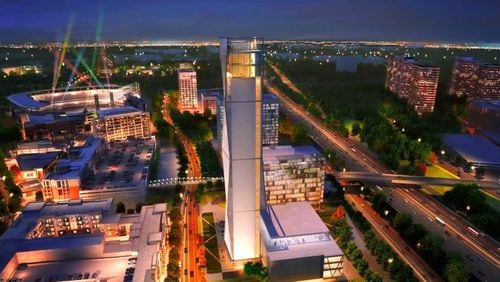Thyssenkrupp Elevators will receive substantial incentives to open a new North American headquarters at SunTrust Park, a deal that is expected to result in more than 600 high-paying jobs and Cobb County’s tallest building — a 420-foot elevator test tower.
The deal, one of the largest of its kind in Cobb since the recession, signals that the suburb can compete with Midtown to attract major technology and engineering firms. But some question the decision to offer millions in tax breaks to corporations as the county, once known for its fiscal conservatism, raises taxes on residents.
The Cobb County Development Authority approved tax breaks for the project worth about $15 million, according to a Georgia Tech analysis. State incentives have not yet been finalized.
The tax breaks for the Thyssenkrupp project amount to the first such incentives within the Battery development, which is owned by an affiliate of the Atlanta Braves.
J.C. Bradbury, an economist at Kennesaw State University, said the issue is complicated by the fact that the Braves themselves benefited from taxpayer subsidies to build SunTrust Park. The Battery wouldn’t have been built without those perks, he said.
Cobb County's obligation on the stadium, including construction and maintenance, amounts to more than $400 million.
“Without that subsidized stadium, they [the Braves] wouldn’t have bought that property,” Bradbury said. “Now they want more subsidies.”
The estimated 2018 tax bill on the land is $84,000, according to county records. The value of the property, with the headquarters complex and tower, will grow substantially over time.
But it will take 11 years before the full value of the project hits the tax rolls.
The Georgia Tech study projected an overall net positive impact on the county and schools tax digests.
Construction is slated to begin later this year and finish by 2022.
A menu of perks
Carlianne Patrick, an assistant professor at Georgia State who has studied tax abatements, said such arrangements have become increasingly common over the past few decades, resulting in a kind of arms race among jurisdictions to offer the sweetest deal. The results have been mixed, she said.
“There is growing public pressure not to just rubber stamp these types of deals anymore,” she said.
Patrick said it was “encouraging” to see that Cobb’s development authority, which has control over abatements, had commissioned a fiscal impact study from Georgia Tech, noting that a surprising number of authorities do no such studies.
Under state law, Georgia offers a menu of perks to companies for the creation of new jobs, including tax credits and grants that could provide several million dollars in additional state incentives for a project of this magnitude.
The announcement Thursday came one day after the Cobb County Commission narrowly voted to raise property taxes. Many upset residents spoke out against tax breaks for large businesses in the leadup to that vote.
The County Commission does not approve incentives, but abating taxes for businesses affects the general fund, increasing pressure to raise taxes on residents.
Cobb Chairman Mike Boyce said he supported the deal, but seemed to acknowledge recent criticism and said the county is working on developing criteria that should be met before he signs a letter of support for any future projects.
“It’s called capitalism,” Boyce said. “Every city, municipality, county is going to do its best to bring a company like Thyssenkrupp to their area.”
A statement from the Braves in response to a question about criticism said the announcement “showcases how county, state, and development leaders come together to ensure a project of this magnitude” will have a positive economic impact on the region.
Rejuvenate corporate interest
Thyssenkrupp picked Atlanta over several other U.S. cities, citing factors including the region’s international airport and workforce talent. The company needs engineers, software developers and corporate jobs such as finance and legal services.
The firm also sought the amenities of an urban location and high visibility, but also wanted affordable land prices.
“The best of urban and suburban is offered at this site,” said Rob Metcalf, an international director for real estate services firm JLL. JLL represented Thyssenkrupp and the Braves in the transaction, and the firm also will manage development of the headquarters building.
Rick Nash, a principal at real estate services firm Avison Young, credited SunTrust Park and the Battery with helping to rejuvenate corporate interest in the Cumberland area.
Vacancy rates in the Cumberland area stood at 18.5 percent as of June, more than 2 percentage points higher than the metro average, according to data from real estate services firm Cushman & Wakefield.
Before the ballpark, Nash said, growth in Cumberland started to slip farther behind other major Atlanta area jobs centers, particularly ones served by MARTA rail. Cobb still doesn’t have MARTA rail, but new managed toll lanes, he said, should help companies overcome congestion.
But announcements such as Thyssenkrupp will give the Cumberland area some mojo for Cobb to try to sell to other corporate prospects, said Nash.
“This is the kind of R&D you want,” he said. “It’s clean, they will have it contained and it’s very high tech. They will be attracting a lot of young people, programmers and engineers.”
Thyssenkrupp deal by the numbers
600+: Proposed number of high-paying jobs
420-feet: Height of elevator test tower (Tallest structure in Cobb)
$15 million: Amount of local tax breaks
$400 million: Amount of public subsidies for the Braves stadium
11: Years before the full value is taxable








